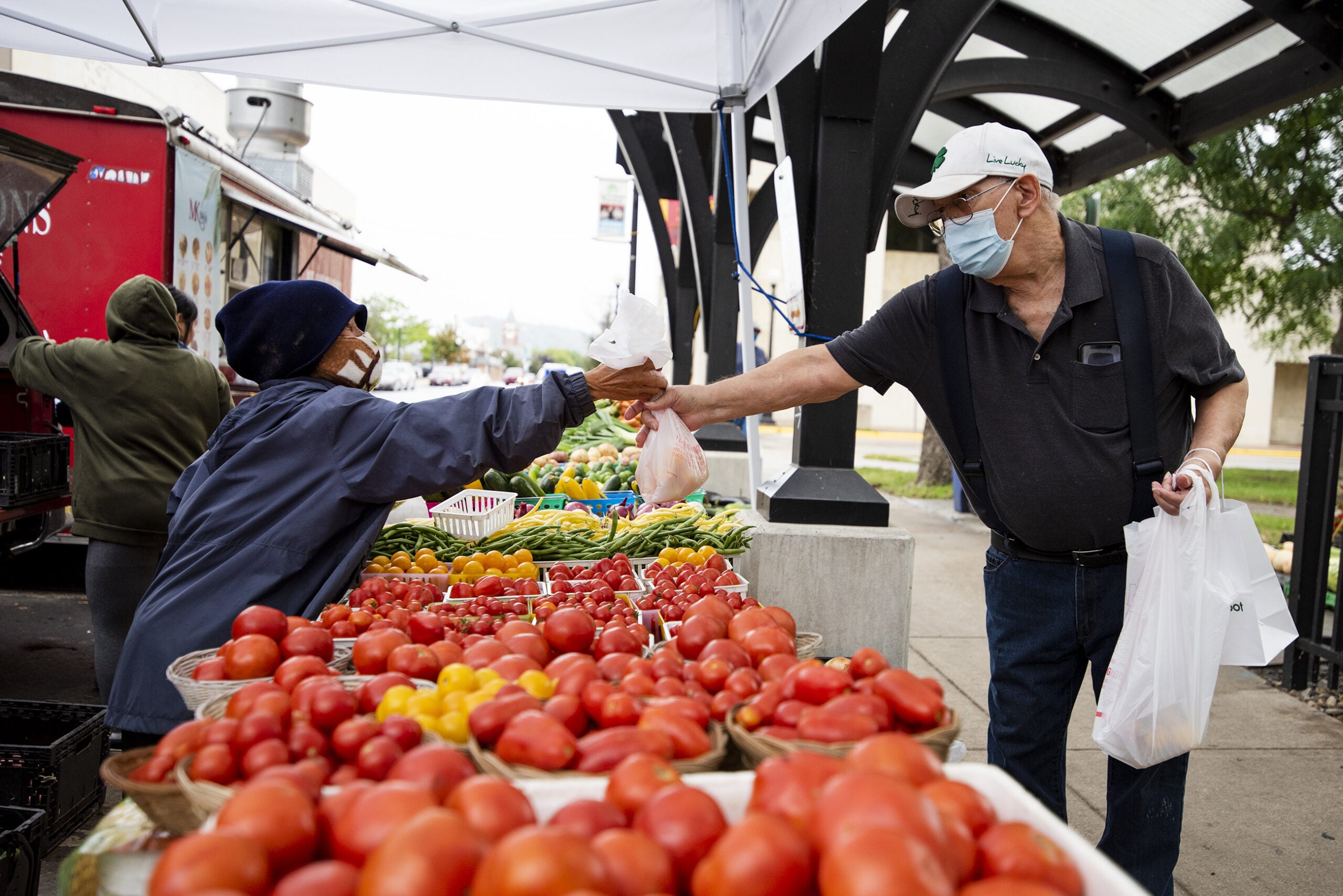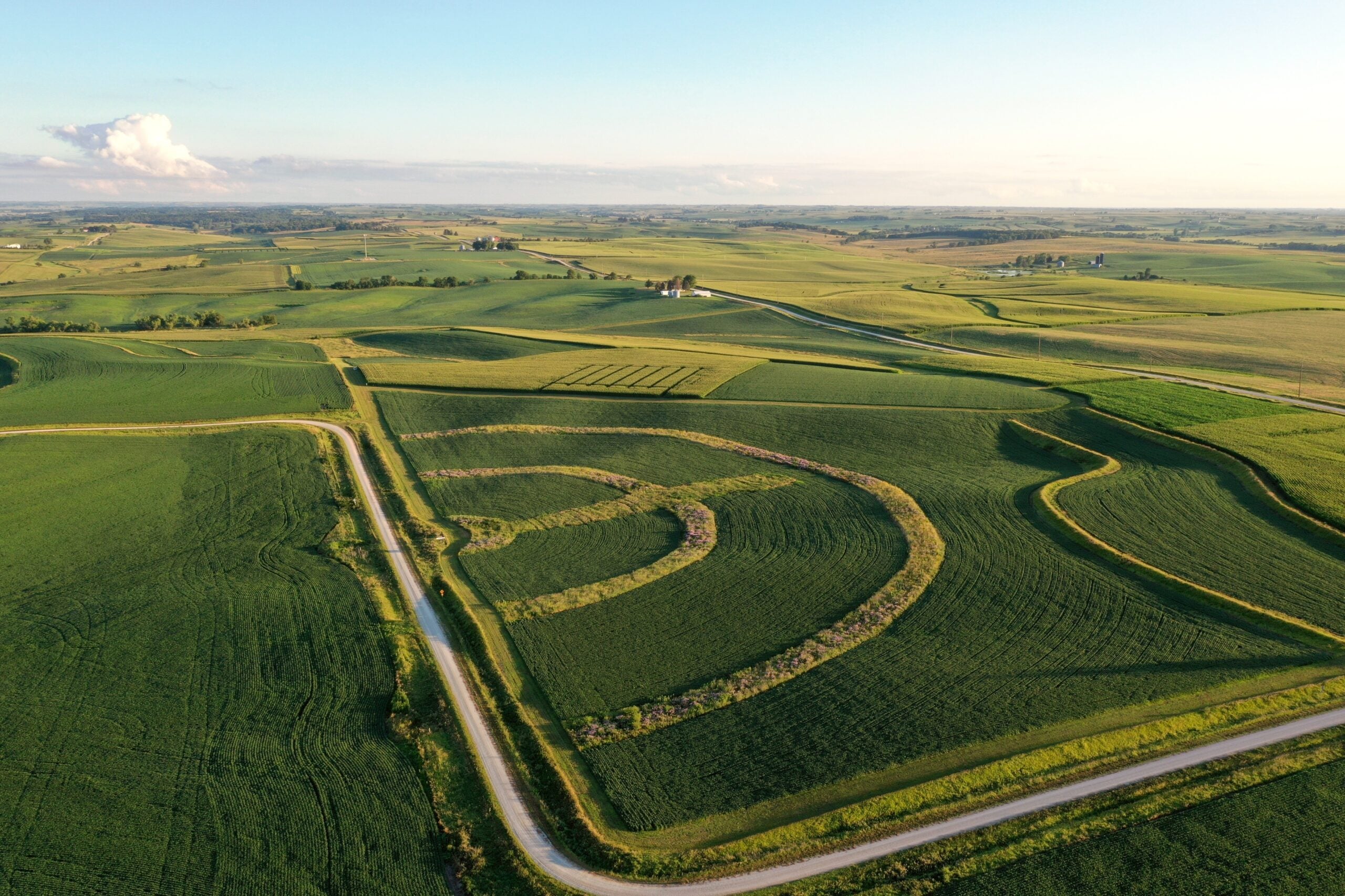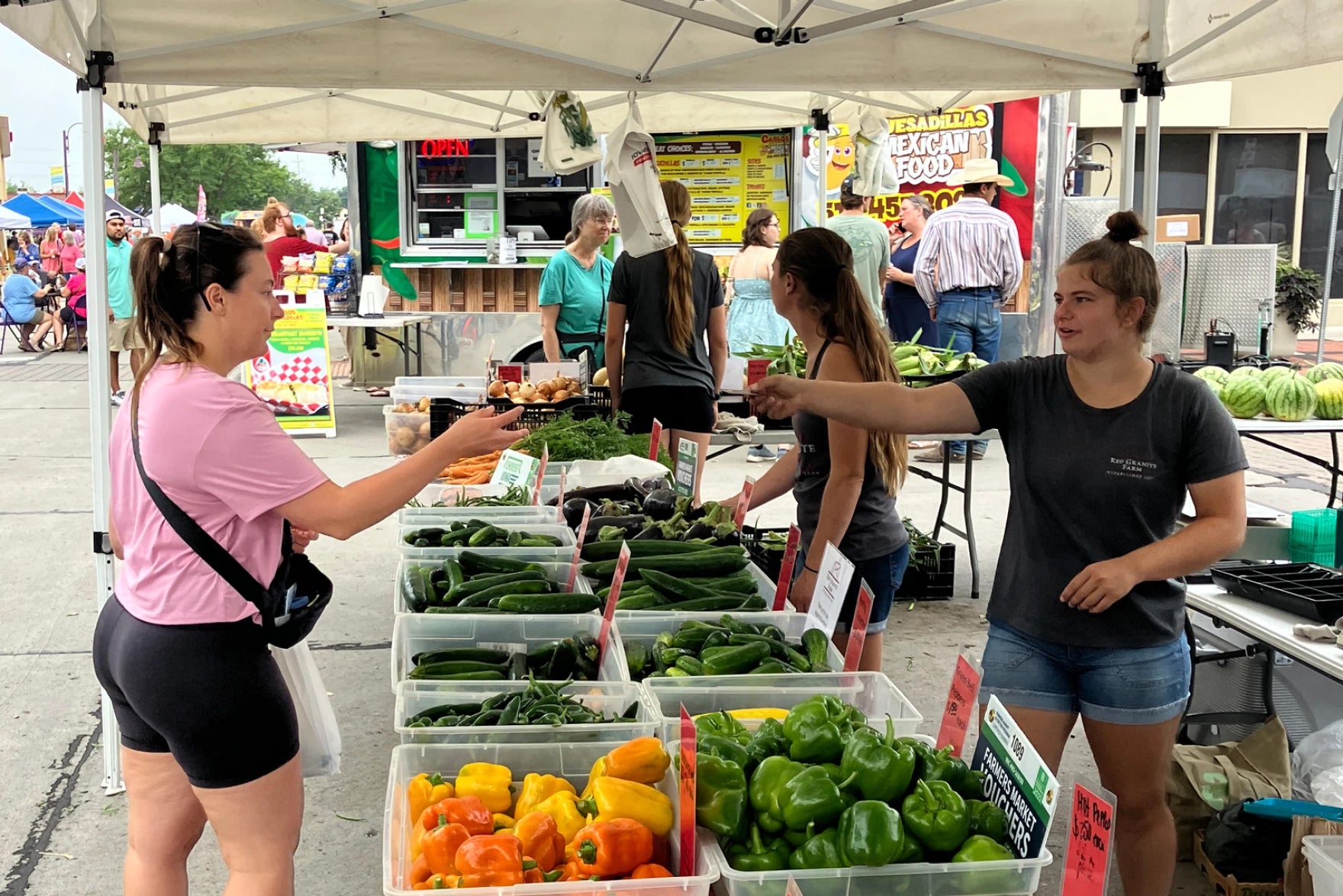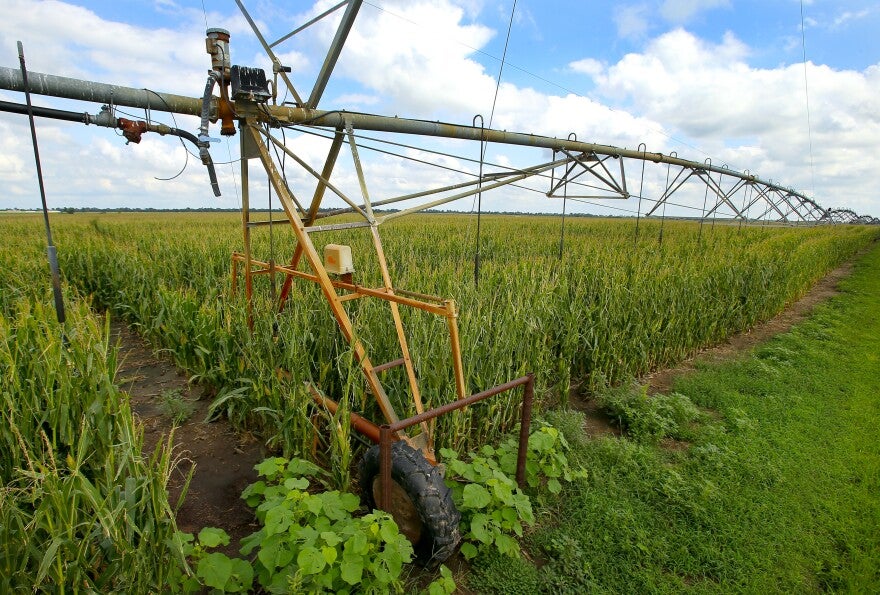At the Cameron Park Farmers Market in La Crosse, Bao Xiong and her mother Kia Lee have tables full of fresh tomatoes, baby bok choy and other produce at their booth.
“We used to have about 64 to 70 items. During high season, yes, we do have 70 items. But this year we probably have about half of that,” Xiong said.
Xiong said her family decided to downsize their garden at the start of the season because of the uncertainty around how COVID-19 would impact farmers markets. Now, weeks away from the end of the season, she said sales have been down around 30 percent from previous years.
News with a little more humanity
WPR’s “Wisconsin Today” newsletter keeps you connected to the state you love without feeling overwhelmed. No paywall. No agenda. No corporate filter.
“The first two weeks, we had probably like 10 customers each week. The traffic was really, really light, and then it took about a month and a half for people to start realizing that the market is open,” Xiong said.
The coronavirus pandemic has caused shortages and other problems across the food industry, from restaurants and grocery stores to meatpacking plants. Producers who rely on farmers markets or other local sales have also felt the effects of the pandemic, as residents across Wisconsin have changed the way they purchase food this year.
[[{“fid”:”1340586″,”view_mode”:”full_width”,”fields”:{“format”:”full_width”,”alignment”:”center”,”field_image_caption[und][0][value]”:”%3Cp%3EBao%20Xiong%20weighs%20tomatoes%20Friday%2C%20Sep.%2011%2C%202020%2C%20at%20Cameron%20Park%20Farmers%20Market%20in%20La%20Crosse.%20%3Cem%3EAngela%20Major%2FWPR%3C%2Fem%3E%3C%2Fp%3E%0A”,”field_image_caption[und][0][format]”:”full_html”,”field_file_image_alt_text[und][0][value]”:”a woman places red tomatoes onto a small scale”,”field_file_image_title_text[und][0][value]”:”Farmers Market”},”type”:”media”,”field_deltas”:{“4”:{“format”:”full_width”,”alignment”:”center”,”field_image_caption[und][0][value]”:”%3Cp%3EBao%20Xiong%20weighs%20tomatoes%20Friday%2C%20Sep.%2011%2C%202020%2C%20at%20Cameron%20Park%20Farmers%20Market%20in%20La%20Crosse.%20%3Cem%3EAngela%20Major%2FWPR%3C%2Fem%3E%3C%2Fp%3E%0A”,”field_image_caption[und][0][format]”:”full_html”,”field_file_image_alt_text[und][0][value]”:”a woman places red tomatoes onto a small scale”,”field_file_image_title_text[und][0][value]”:”Farmers Market”}},”link_text”:false,”attributes”:{“alt”:”a woman places red tomatoes onto a small scale”,”title”:”Farmers Market”,”class”:”media-element file-full-width media-wysiwyg-align-center”,”data-delta”:”4″}}]]
Kristin Krokowski is the director of the Wisconsin Farmers Market Association. She said markets across the state have had to make changes to way they operate, just like grocery stores. Especially in urban areas, markets have tended to have more people with less ability to spread out.
“At a normal market, you would have four people in an 8-foot area picking through the sweet corn. And that’s not something that’s really practical anymore because you need to have the social distancing,” Krokowski said. “That kind of slows things down. Some customers get frustrated by that. They don’t want to have to wait. They want to kind of come and get their stuff and go.”
Krokowski said sales are down for most vendors in the state, but not what she would describe as “catastrophically”. She said how producers fare largely depends on how profitable they were before COVID-19.
“People will get through this year and hopefully not take any kind of huge loss or not lose their business. But it’s not going to be necessarily a very good year for most of the folks that we work with,” Krokowski said.
Bao Xiong said her family is still figuring out how this season will affect their ability to plant next year. She said most of the farmers at the market are in a similar situation.
“Honestly, I think we might see probably a decline in… vendors next year. I’m not certain about that, but that has been the sign. And probably less produce as well, in quantity and in variety,” Xiong said.
She said her family planted fewer varieties of vegetables this year and stopped growing specialty crops like ginger, opting instead for things they know will sell easily.
[[{“fid”:”1340576″,”view_mode”:”full_width”,”fields”:{“alt”:”a woman in a red jacket passes displays of flowers while holding her own flowers in her arms”,”title”:”Farmers Market”,”class”:”media-element file-full”,”data-delta”:”2″,”format”:”full_width”,”alignment”:”center”,”field_image_caption[und][0][value]”:”%3Cp%3EA%20customer%20walks%20on%20the%20sidewalk%20holding%20flowers%20Friday%2C%20Sept.%2011%2C%202020%2C%20at%20Cameron%20Park%20Farmers%20Market%20in%20La%20Crosse.%20%3Cem%3EAngela%20Major%2FWPR%3C%2Fem%3E%3C%2Fp%3E%0A”,”field_image_caption[und][0][format]”:”full_html”,”field_file_image_alt_text[und][0][value]”:”a woman in a red jacket passes displays of flowers while holding her own flowers in her arms”,”field_file_image_title_text[und][0][value]”:”Farmers Market”},”type”:”media”,”field_deltas”:{“2”:{“alt”:”a woman in a red jacket passes displays of flowers while holding her own flowers in her arms”,”title”:”Farmers Market”,”class”:”media-element file-full”,”data-delta”:”2″,”format”:”full_width”,”alignment”:”center”,”field_image_caption[und][0][value]”:”%3Cp%3EA%20customer%20walks%20on%20the%20sidewalk%20holding%20flowers%20Friday%2C%20Sept.%2011%2C%202020%2C%20at%20Cameron%20Park%20Farmers%20Market%20in%20La%20Crosse.%20%3Cem%3EAngela%20Major%2FWPR%3C%2Fem%3E%3C%2Fp%3E%0A”,”field_image_caption[und][0][format]”:”full_html”,”field_file_image_alt_text[und][0][value]”:”a woman in a red jacket passes displays of flowers while holding her own flowers in her arms”,”field_file_image_title_text[und][0][value]”:”Farmers Market”}},”link_text”:false,”attributes”:{“alt”:”a woman in a red jacket passes displays of flowers while holding her own flowers in her arms”,”title”:”Farmers Market”,”class”:”media-element file-full-width media-wysiwyg-align-center”,”data-delta”:”2″}}]]
While Sales At Markets Fall, Demand For CSA Boxes Skyrockets
The pandemic hasn’t been all bad for local food producers.
Chuck Anderas, organic specialist for the Midwest Organic and Sustainable Education Service, said farmers offering shares in community supported agriculture, or CSA, saw interest skyrocket this spring. He said shortages at grocery stores caused consumers to look for a more reliable source of produce or meat from local farmers.
“I know some that really expanded the amount of shares they offer and sold out really quickly,” Anderas said. “I was trying to help some of my friends find CSAs and had to go down the list of several farms before I could find one with shares available.”
He said farmers also invested in setting up online stores and expanding delivery options to keep up with the changing demand.
“I think farmers are finding it to be just as cost-effective as sitting at a farmers market, because that also has the opportunity cost of what else you could be doing in that time. It takes up an entire day basically,” Anderas said. “If you sell at a farmers market and it’s raining that day, you’ll get fewer customers, and that can cause a big dent in your income.”
Anderas said most vegetable producers he works with haven’t made huge changes to the kinds of places they’re selling, other than shifting sales away from restaurants to grocery stores in need of product this spring.
But he said many of the producers that have expanded this summer are worried about how they’ll retain customers once supply chains return to normal — especially with vegetable CSAs, which previously had been seeing a major decline in interest.
“The concern is that people who are new to CSA may not continue with it next season. So (producers are) trying to help people along and understand what to do with some of the veggies that they’re maybe not used to like kohlrabi or fennel and things like that,” Anderas said.
[[{“fid”:”1340591″,”view_mode”:”full_width”,”fields”:{“format”:”full_width”,”alignment”:”center”,”field_image_caption[und][0][value]”:”%3Cp%3EVegetables%20are%20displayed%20on%20a%20table%20Friday%2C%20Sep.%2011%2C%202020%2C%20at%20Cameron%20Park%20Farmers%20Market%20in%20La%20Crosse.%20%3Cem%3EAngela%20Major%2FWPR%3C%2Fem%3E%3C%2Fp%3E%0A”,”field_image_caption[und][0][format]”:”full_html”,”field_file_image_alt_text[und][0][value]”:”bright vegetables including carrots and green onions are displayed on a table”,”field_file_image_title_text[und][0][value]”:”Farmers Market”},”type”:”media”,”field_deltas”:{“5”:{“format”:”full_width”,”alignment”:”center”,”field_image_caption[und][0][value]”:”%3Cp%3EVegetables%20are%20displayed%20on%20a%20table%20Friday%2C%20Sep.%2011%2C%202020%2C%20at%20Cameron%20Park%20Farmers%20Market%20in%20La%20Crosse.%20%3Cem%3EAngela%20Major%2FWPR%3C%2Fem%3E%3C%2Fp%3E%0A”,”field_image_caption[und][0][format]”:”full_html”,”field_file_image_alt_text[und][0][value]”:”bright vegetables including carrots and green onions are displayed on a table”,”field_file_image_title_text[und][0][value]”:”Farmers Market”}},”link_text”:false,”attributes”:{“alt”:”bright vegetables including carrots and green onions are displayed on a table”,”title”:”Farmers Market”,”class”:”media-element file-full-width media-wysiwyg-align-center”,”data-delta”:”5″}}]]
Peter Allen, owner of Mastodon Valley Farm in Viola, is one of the CSA farmers that saw demand for his products boom this year. He offers a meat CSA from his grass-fed and pastured livestock and has sold at least 25 percent more shares this year than he did in all 2019.
“We definitely saw a big increase in demand right when they were talking about meat shortages,” Allen said. “We could have gone up more if there had been more openings in local slaughterhouses, which all got booked up there when that announcement was made. Everybody scrambled.”
Allen already sold his CSA shares and bulk orders online before COVID-19. He’s hopeful that his new customers will stick around when the pandemic ends, mainly because the monthly subscription-based model he offers is how a growing number of consumers want to shop.
“We’re going to have to evolve more efficient, local food systems that sort of unfortunately in a way cater to people’s expectations for sort of on-demand, one-click shopping,” Allen said.
He said having food dropped off at your door is simply more desirable to customers now, regardless of whether there’s a global pandemic.
Wisconsin Public Radio, © Copyright 2026, Board of Regents of the University of Wisconsin System and Wisconsin Educational Communications Board.






